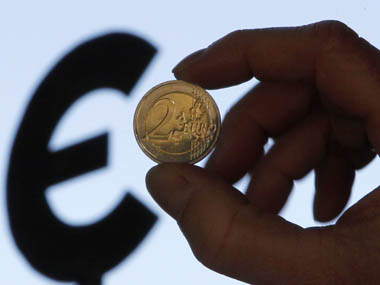What kind of nut would lend you 100 bucks and say you can return 99 after a few months?
Well, apparently there are thousands of such nuts in the eurozone - which is just a hop, step and jump away from financial implosion.
Earlier this week, the European Financial Stability Facility - which lends money to beleaguered governments - borrowed 1.43 billion for three months at a yield of -0.0217 percent. This means investors will get back less than they invested - and they are not being arm-twisted to do this.
[caption id=“attachment_414079” align=“alignleft” width=“380”]  A government lending you Rs 100 and asking you to repay Rs 99 is merely encouraging you to spend your way out of recession. Reuters[/caption]
Writing in a Wall Street Journal blog, David Wessel notes that “Denmark recently raised 420 million kroner ($70 million) at minus 0.59 percent. Even more remarkable, Germany borrowed 4.17 billion for two years at an average yield of minus 0.06 percent. Markets have pushed two-year yields on Swiss government debt below zero regularly, and Belgium, Finland and the Netherlands occasionally.”
But this still begs the question: Why would anyone lend 100 to get back less than 100? You might as well keep money under the mattress where a 100 quid remains 100, assuming white ants don’t chew it all up.
A government lending you Rs 100 and asking you to repay Rs 99 is merely encouraging you to spend your way out of recession. But why should you return that compliment to a government? Why should you sacrifice your hard-earned money for the government’s well-being?
Wessel’s answer runs something like this: because people are scared.
Says he: “With so much anxiety about the ability of some governments to pay their debts and the viability of some banks, investors are paying for safety. In Europe, if they hold euros, they want to be sure they get euros back; they are avoiding countries that might abandon the common currency.”
If you lend euros to a Greek (or a Spanish) bank, the chances are a bankrupt Greece may, at some point, either repudiate the debt or give you drachmas instead of euros - if it opts out of the euro. Once out of the euro, drachmas will crash against the euro. So in this scenario, lending euros for negative interest rates is rational.
However, the rise of this kind of “rationality” can mean only one thing: no one is willing to bet on the longevity of the euro. The euro may be on its last legs.


)
)
)
)
)
)
)
)
)



